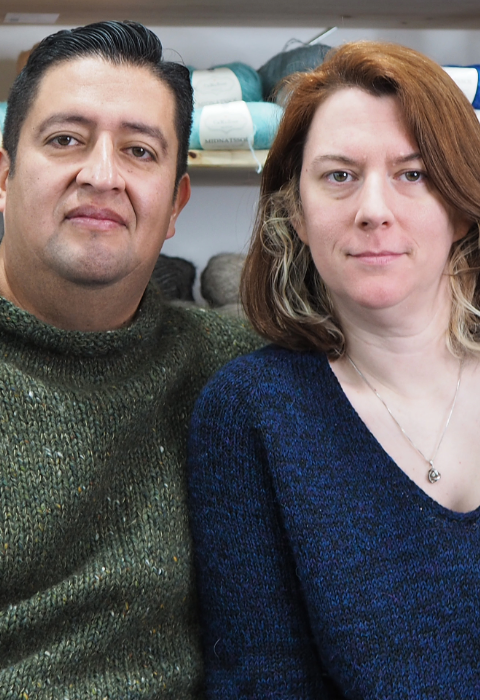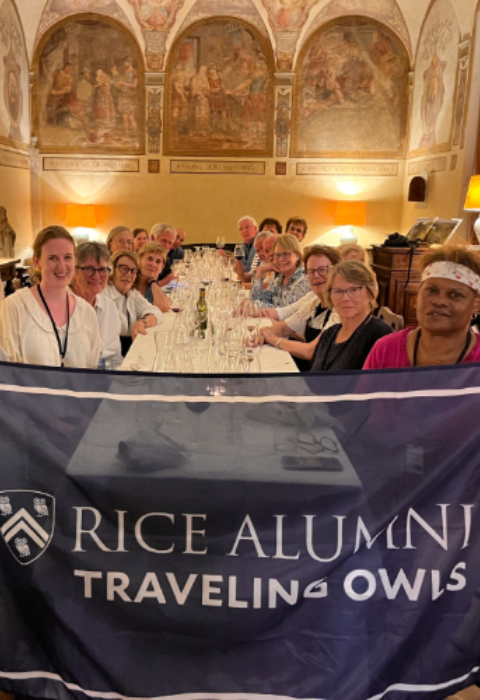
Michelle Gadd’s ’93 journey into ecology began early. “I watched way too much PBS as a child,” she recalled. “I’d memorized every documentary by the time I was 10, but I didn’t realize it could be a career until I studied abroad in Kenya during my junior year at Rice.”
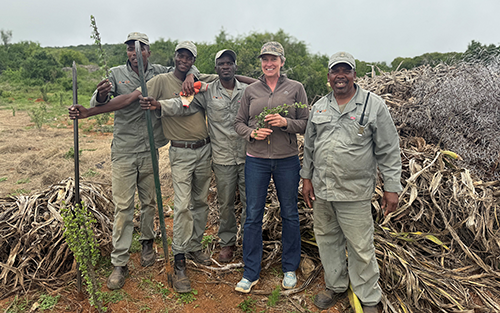
The trip that changed her life happened by chance. “I found a brochure for a field studies program in Africa on a friend’s coffee table,” she said. “It had a picture of giraffes on the savanna on the cover, and I thought, ‘This is where I’m going.’ I went that spring, stayed through the summer and hitchhiked across Kenya, Tanzania and Malawi.”
In Kenya, Michelle discovered that biology could be more than just lab work — it could be an outdoor adventure. “At Rice, my studies had all been indoors and lab-focused, but my time in Kenya opened my eyes to what was out there,” she said.
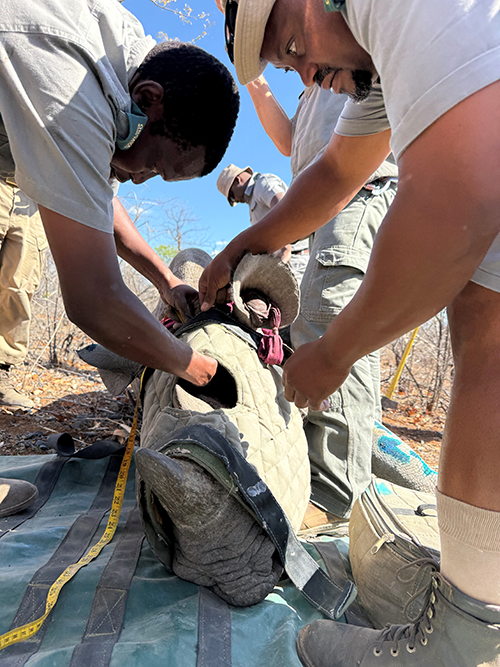
After returning to Rice for her senior year, Michelle reached out to professors and biologists, securing a research opportunity in the Democratic Republic of Congo (then Zaire) to study frogs. When that role ended, she took a temp job in the U.S. and later won a Rotary Ambassadorial Scholarship to study in South Africa during the post-apartheid era. “The essay really wrote itself,” she said. With the scholarship, Michelle earned a master’s at the University of the Witwatersrand in Johannesburg, researching the impact of elephants on vegetation.
Michelle then pursued her doctorate at the University of California, Davis, studying elephant ecology and conservation in Laikipia, Kenya. “Elephants are amazing animals, but they’re hard to live with — both for farmers and conservation managers,” she explained. “They have a very marked impact on the vegetation, and they can transform woodland into grassland. Because elephants’ migration pathways are being cut off by humans, we unfortunately are shifting to a system where elephants are forced into small places and their impact on the environment, repeatedly eating on the same trees and shrubs, can be significant.”
As part of her doctoral research, Michelle set up megaherbivore exclosures to study the impact of elephants on vegetation, spending seven years monitoring the effects. “People often blame elephants for changes in the ecosystem or degradation of vegetation without looking at the effect of human behavior, cattle herders, cattle and other wild herbivores,” she said. “We set up an experiment using different types of fencing to isolate these impacts. It took quite a bit of time for that vegetation to grow and show the impact of the experiment.”
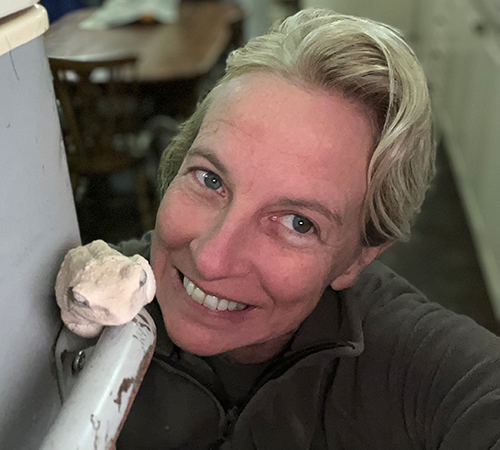
In her fifth PhD year, Michelle received a Fulbright to study elephant ecology and conflict in Botswana. “I wanted to compare Kenya’s strict wildlife preservation approach with Botswana’s pro-hunting policies and see how these differences shaped local attitudes toward wildlife,” she said. She found that when financial benefits derived from elephant-centered tourism were delivered with a pro-conservation message, communities were more supportive of elephants, while those who received financial benefits without outreach explaining the link to wildlife did not express appreciation.
After completing her Fulbright, Michelle returned to Kenya to measure her ecological findings. “I had to measure each and every canopy and stem, all my vegetation inside and outside my 18 plots,” she said. “I had six different levels of herbivory and three replicas of each. I observed how different tree species changed shape, size and height based on different herbivore pressures.”
At the time, around 5,000 elephants roamed freely among mostly unfenced cattle ranches, navigating human settlements. “I couldn’t control the elephants, so I would do a regular dung count to estimate their presence,” Michelle explained. “Our field assistants, who were mostly Maasai and Turkana, worked with cattle herders, using a fenced area to control cattle density for my experiments.”
After earning her doctorate, Michelle served as the head of the African elephant and African rhino programs at the United States Fish and Wildlife Service (USFWS), providing financial and technical support across sub-Saharan Africa. “Our focus was on protecting elephants and rhinos in their home countries, as well as supporting the rangers who safeguard them,” she said. “We helped support and identify conservation priorities for 37 elephant range countries and 10 rhino range countries.”
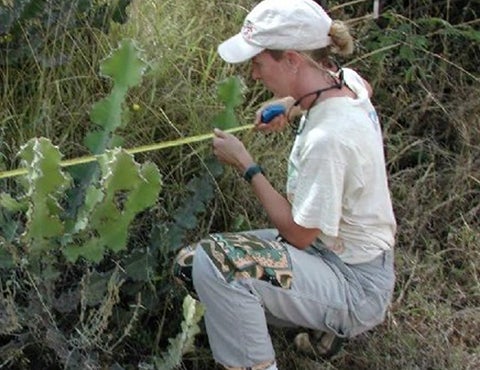
In 2019, Michelle transitioned from USFWS to oversee wildlife conservation initiatives for Kimbra and Mark Walter. “Mark Walter, a genius businessperson, decided to use his wealth to save elephants and rhinos,” Michelle said. “He purchased land in Zimbabwe that was at risk of being subdivided, then reached out for advice on managing African conservation areas. I didn’t plan to leave my previous role, but it was amazing to meet these people — their attitude, generosity and commitment to make a real difference with the wealth they’ve created.”
Michelle was impressed by their fresh approach to wildlife conservation. “They use their business acumen to create something self-sustaining and marketable that is not going to be donor-dependent,” she said. “They invest in core operations, but they're also interested in creating entrepreneurship and revenue-generating activities for local people. We now have wildlife areas in three countries, with significant populations of rhinos — both black and white — as well as elephants, lions and giraffes. We're restoring degraded land and creating wildlife-based economic opportunities.”
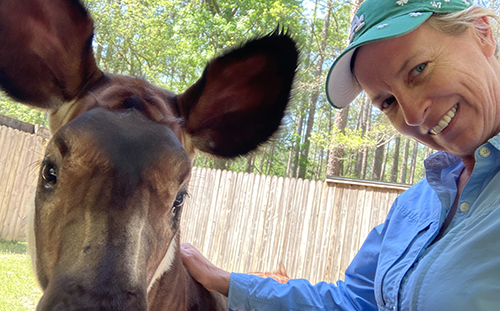
With a team of 800 employees across Africa, Michelle ensures their needs are met so they can effectively conserve wildlife. “Our team is the heart and muscle behind our work,” she said. “The Walters are the heart and the wallet, and my job is to connect the two, representing our employees’ needs to Mark and Kimbra and helping secure the funding.”
Michelle reflects that her time at Rice wasn’t a straightforward success story, but it played a pivotal role in shaping her journey. “I really struggled at Rice; it was very competitive, and I was no longer the smartest person in the room,” she shared. “But that challenge pushed me to find my own path. I worked my tail off, and I pursued every opportunity. It made for a very long road, but I was determined to help wildlife in a big way.”

